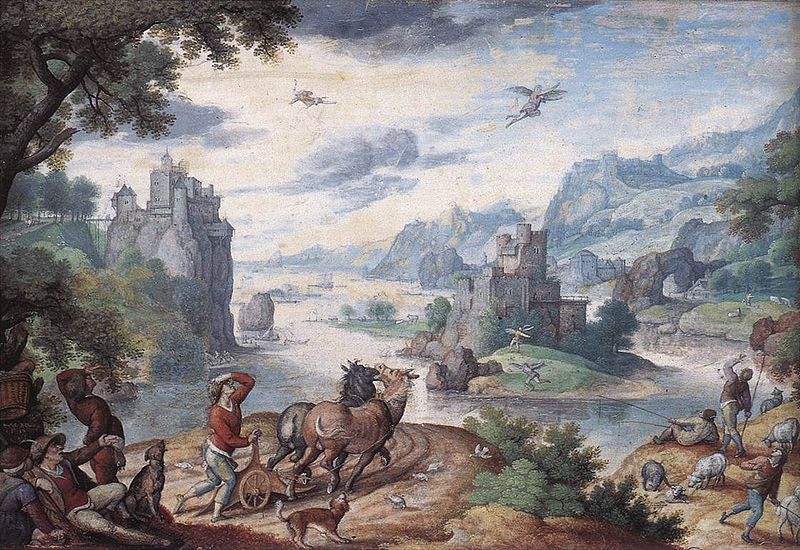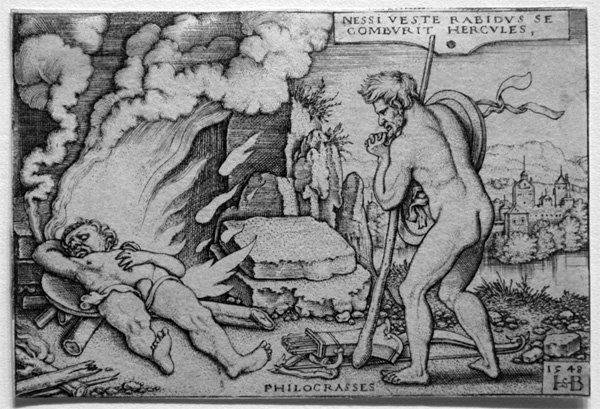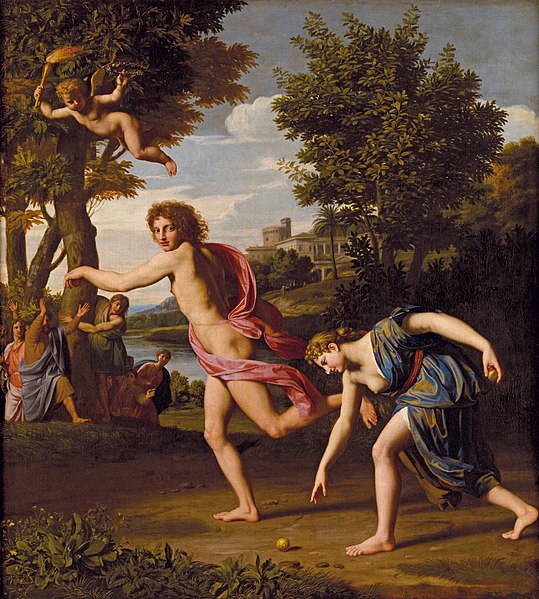Diary of Alcemna.
Entry 1:
Oh diary, I am very upset at this time, and I must confide in you the keeper of my secrets. I been tricked! I thought my poor, but wonderful, husband had returned home early from war. After a short reunion he states he must return to his post. This would have been fine, but instead of walking out of our home, he walked to the window instead. Before I could ask him what he was doing he turned into an eagle and flew out into the night! I knew in that very moment that it was not my husband but a god, possibly Zeus himself! I am too upset to write anymore, I shall continue tomorrow.
Entry 2: (A few weeks have passed)
I have returned diary, but not without the worst news. My, real, husband's fleet has finally returned from war and despite their victories there is awful talk of my beloved. Rumor has it that while they were in battle he had prayed to the mighty Zeus that he would return home to his spouse. Zeus heard his prayer, and protected him throughout the battle. When battle was over all the men of the army ventured to nearby temples to sacrifice to the gods. This is where my husband made his mistake, he became hot-headed and boldly stated that he did not need Zeus' aide. He continued that skill was untouchable by any warrior, and decided not to give sacrifice. Zeus quickly overheard this and was enraged. Before he could plot death on the battle field, the enemy surrendered and war was over. He learned that this man had a beautiful and loyal wife, and decided this would be his revenge tactic. After his deed, he visited my husband in his dreams and told him of his actions. He told him that he had impregnated me with who will become the most powerful hero in ages. I have yet to see my husband in person, diary, but I hope that he is not angry with me. I will soon write of our reunion.
Entry 3:
Oh diary, this scenario is growing worse with each passing day. More bad news has come. My husband has finally returned home, and accepts my pregnancy fearing to further anger the might king of the gods. Before I could say anything on the matter a messenger swiftly enters our chamber. He stated that Hera, wife of Zeus, has heard of her husband's infidelity. She seeks revenge on me and my unborn child. He tell us while at a banquet of the gods Zeus, who was intoxicated, stated that he has been a victim of Cupid's powerful influence, and has created a descendant of half immortality. He continued to state that this child would grow to be a great, powerful, hero and all will worship him. With this statement Hera was irate with embarrassment, and quickly left the hall. Before my husband, and I, could ask the messenger where he had heard such an elaborate story, he quickly relayed that he is Hermes and disappeared in thin air. Oh what am I to do!
Entry 4: (Nine month's later)
I have not written in such a while, but the time is near for me to give birth. Surprisingly there has been no more talk of Hera's revenge on me and my child. It has been eerily peaceful throughout my pregnancy, and I am afraid a storm is brewing. My abdomen has stretched far, womb heavy with child, it is unmistakable that I am pregnant with a god's offspring. Pregnancy tires me, diary, I will write after childbirth is over.
Entry 5:
So much has happened in two weeks time. I have given birth to a son, and named him Hercules. It was not without turmoil though, and if it were not for my loyal servant Galanthis I could still be in labor at this very moment. The story follows:
I had been in labor for seven consecutive days. On day seven I felt my will and strength withering, and I called to the heavens for Lucina to visit me. Lucina is the infamous goddess of childbirth, and she soon arrived at my doorstep with a grin on her face. "Oh look at you," she said, "it was unfortunate to have been impregnated by Zeus for his wife is enjoying your agony." A cold chill ran down my spine, but was quickly replaced by a contraction. I pleaded in pain, but she sat in the doorway with her hands clasped over her knees. Everyone in the house knew that if Lucina remained unpersuaded, I may suffer death from childbirth. My Galanthis heard the words spoken by Lucina, and she decided to concoct a plan to trick her. Later in the evening I had fallen into a slumber from exhaustion, and there was an unusual silence inside my home. Lucina was lounging in the front room, hands still clasped, and was talking leisurely with her nymphs. There was a sudden wale of a child. Lucina, startled, leaped from her seat and ran into my chamber. As she stood she momentarily released the clasp of her hands, and I awakened to my womb opening and childbirth was over. Lucina witnessed the birth, and realized she had been tricked. Galanthis had borrowed her cousin's babe, and once I was had fallen asleep she took this opportunity to stage the fake birth of my Hercules. Lucina, fuming, grabbed Galanthis and screamed, "You wretched girl! "Since you have tricked me, and act as a pet to your master, I will turn you into one!" Galanthis was transformed into a dog, and is cursed to carry litters to lengthen the agony of childbirth. Although Galanthis made a significant sacrifice for me, she still frequents my home, and I have ordered all to treat her lavishly. Now that Hercules is born I hope the torture has ended, but only Fate knows...

Author's Note: I wrote this story based off Ovid's story of
The Birth of Hercules in his book Metamorphoses. Metamorphoses is known as a mix collection of old Roman Myths translated into enlgish pertaining to transformations. In the original there is no back story of how Alcemna and Zues conceived Herules, in fact the tale is a story within a story, and Alcemna is trying to console another woman as she herself is giving birth. In the original Lucina has been sworn to prolong or prevent the birth of Hercules, per Juno, and she is tricked by Galanthis. Though, in this version of the tale Galanthis tells Lucina that Alcmna has given birth and she must go congratulate her. Lucina then jumps up, unclamps her hands, and Alcmna was able to give birth. The goddess quickly realizes that she had been tricked, and turns Galanthis into a weasel instead of a dog. Since her trick had to do with childbirth she was cursed to give birth through her mouth from then on. The introduction of the text explains that the Roman's actually believed that weasel's gave birth through their mouths. I decided to tell it in a diary fashion so I could elaborate in the point of view of just Alcemna. I excluded the part where she is telling the story to another woman, to limit word count, and instead used a diary so that she could still be confiding in someone. This was also one of the shorter stories in Metamorphoses, and I liked this so I could elaborate and make up points that were left untold in the original.
Bibliography:
Book: Metamorphoses
Author: Tony Kline (Translated Ovid's original into english)
Year Published: 2000
.jpg)










.jpg)




